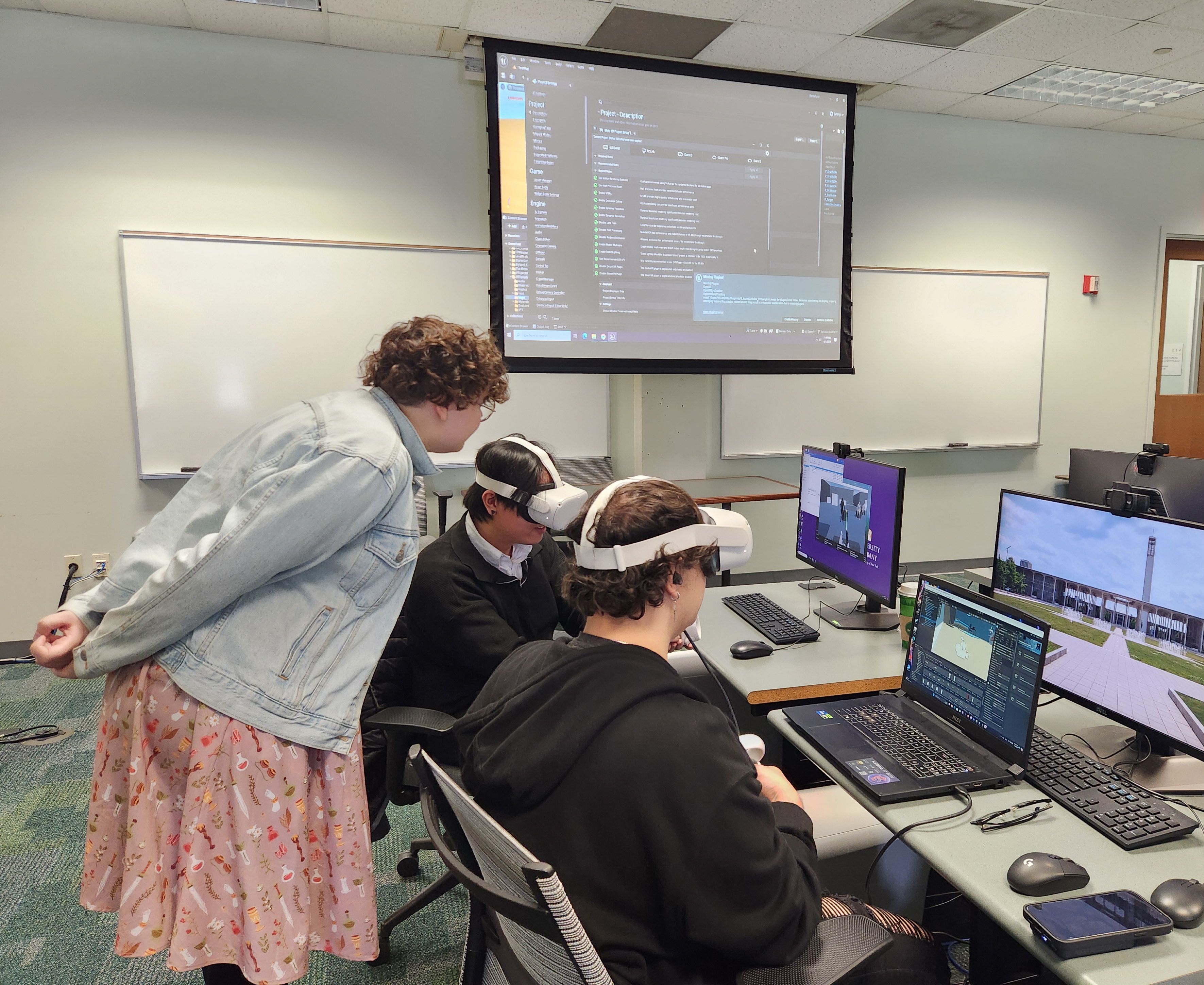Showcase 2024: Virtual Reality in the Classroom

By Mike Nolan
ALBANY, N.Y. (April 16, 2024) — A new course at the College of Emergency Preparedness, Homeland Security and Cybersecurity (CEHC) is empowering the next generation of metaverse creators.
This semester’s Informatics (INF) 496 special topics class is the University’s first semester-long course focused on augmented reality (AR) and virtual reality (VR) design & development, two of the hottest emerging technologies on the market.
The metaverse, a network of 3D virtual worlds, uses VR to connect users around the globe. While VR completely immerses users in a simulated environment, AR blends virtual content with the real world, enhancing the user's perception of reality in the physical world.
There are already 400 million active metaverse users every month, and by 2026, it is projected that 25 percent of Americans will spend at least one hour a day interacting with each other and computer-generated objects in the virtual world.
Claire Thomas, an instructor in CEHC’s Department of Information Sciences and Technology and co-founder of Pine Drake Games in Troy, is teaching the new course this semester from a computer lab in the Science Library.
“My specialty is in video game development,” said Thomas. “After working in the industry and forming an independent game studio in Troy, I decided it was time to start teaching. This is a fantastic opportunity for students. They are able to express themselves and learn the basics of programming and creating software.”
Exploring VR/AR Game Development
To support the course, Thomas is utilizing 30 Meta Quest 2 headsets, the most popular and accessible VR headset currently available to consumers. The headsets were provided courtesy of CEHC Professor of Practice Michael Leczinsky, who teaches several courses that focus on trends in emerging tech and was selected last year for a “Create with VR Headset Grant.”
The grant program, a partnership between Meta, the parent company of Facebook, and Unity, one of the industry’s leading 3D game development platforms, aims to support secondary and post-secondary educators who are teaching courses in VR development.

Students in the VR/AR course can use the headsets during class time and check them out to continue developing their games.
“Some of the students have never played with a VR headset before,” said Thomas. “It’s a big deal to have them accessible to us for teaching.”
Junior informatics major Cory McCarthy is among the 19 students enrolled in the course this semester. He’s developing a game called “Snack and Skedaddle,” where you play as a small, frightened mouse in a home and collect as much food as possible without being caught by a cat named Dewey.
“At last year’s CEHC Showcase, I was told about this new course that did not have any prerequisites besides having an interest in game design,” McCarthy said. “Although the gaming industry was not something that I expected to get into when I transferred to UAlbany last year, it has all lined up for me. I’m excited to see where I can take it after graduation.”
UAlbany Showcase Day
Playable VR/AR game demos from students will be on display Tuesday, April 30 for UAlbany Showcase day, which brings together the entire University community to highlight the academic excellence of students through their research, scholarship, creative activities and experiential learning.
The day-long event will be held across the Uptown Campus, including the Lecture Center Concourse, Campus Center, University Art Museum, University Libraries, Performing Arts Center, ETEC and newly renovated Broadview Center.
Students in the VR/AR course will join students from INF371: Game Design & Development I and INF 471: Game Design & Development II in ETEC, showing off more than 70 created games to campus.
“We’re going to make flyers for our games and have people try them out at Showcase, which I’m really excited about," McCarthy said. “We’ve been putting a lot of focus into creating them.”
CEHC plans to extend the rollout of the Meta Quest 2 headsets to more undergraduate and graduate classes, accepted student days, public outreach events with local K-12 schools and community organizations.
The college currently offers a game design and development minor and concentration and has plans to build the program into a major in the near future.




